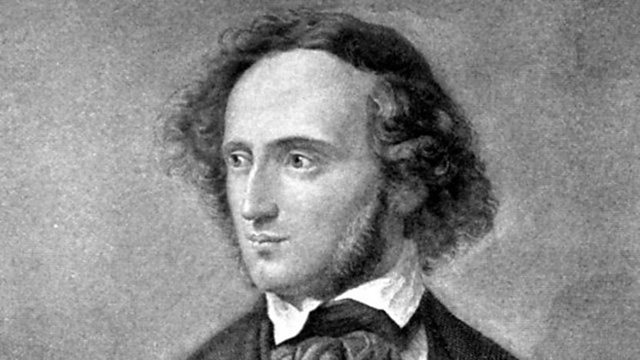Felix Mendelssohn: Last Seven Years
Donald Macleod explores Felix Mendelssohn's last seven years.
Donald Macleod explores Felix Mendelssohn's last seven years, starting with his appointment in 1841 to the post of Royal Prussian Kapellmeister in his home town of Berlin. For the previous six years Mendelssohn had been based in Leipzig, as director of the Gewandhaus Concerts. He had been spectacularly successful, turning the orchestra there into one of the finest in Europe - and thereby making himself an attractive prospect for neighbouring rulers to poach.
The new King of Prussia, Friedrich Wilhelm IV, wanted to make Berlin a cultural centre to be reckoned with, and had decided that Mendelssohn was the man for the job. After six months of strenuous but largely unsuccessful attempts to hammer out the responsibilities of his post, Mendelssohn was offered a lucrative one-year contract on a pretty much take-it-or-leave-it basis; he took it, but the job remained ill-defined and he grew increasingly frustrated - not least with the lack of any progress whatsoever on the proposed new Berlin Conservatory, the creation of which had been a major carrot during the negotiations. Mendelssohn's incidental music to Sophocles' Antigone is one of the few fruits of this first Berlin post; but at least he had plenty of time to get to grips with the composition of his 'Scottish' Symphony, the seeds of which had been sown during his visit to the ruins of Queen Mary's palace of Holyrood in 1829. On hearing the symphony, one contemporary critic astutely commented, "we may prophesy that it will rouse pure feeling of pleasure everywhere".
Donald Macleod concludes his exploration of Mendelssohn's last seven years with a look at the genesis of his oratorio Elijah, whose popularity in Victorian England was second only to that of Handel's Messiah - certainly not a claim that could be made today, when it tends to be regarded as the height of kitsch. In 1846, the city of Birmingham invited Mendelssohn to take charge of its music festival. He turned the job down, but agreed instead to compose an oratorio for the festival. After the earlier success of his oratorio St Paul, Mendelssohn had considered composing an Elijah; the Birmingham commission prompted him to return to this idea, which he'd had on the back burner for the past 10 years. The first performance was a huge success - "Never was there a more complete triumph!", as The Times put it - but Mendelssohn wasn't completely satisfied, and immediately set about overhauling the work for the London premi锟絩e the following year.
According to a contemporary report it was met with a "long-continued unanimous volley of plaudits, vociferous and deafening applause." Mendelssohn's elation, however, was short-lived. On his return to Germany he was met by a letter from his brother Paul, telling him that their beloved sister Fanny had suffered a series of strokes and died - while rehearsing one of his pieces. Mendelssohn remained in a state of emotional collapse for some time, but when he was able to compose again he poured his grief out in his anguished 6th String Quartet - the last major work he completed before his own death, just two months later.
Duration:
Credits
| Role | Contributor |
|---|---|
| Composer | Felix Mendelssohn |
This clip is from
Featured in...
![]()
Discovering Mendelssohn—Composer of the Week
Listen to programmes examining the life and works of Felix Mendelssohn.
More clips from Composer of the Week
-
![]()
Wrth fynd efo Deio i Dywyn (trad.) arr. Jayne Davies
Duration: 01:46
-
![]()
Lisa l芒n (traditional) , arr. Jayne Davies
Duration: 03:12
-
![]()
Morfydd Owen's Llwyn Owen, arr. Edward-Rhys Harry
Duration: 05:17
-
![]()
Blacklisted!—Sofia Gubaidulina (b 1931), An Incorrect Path
Duration: 01:21







